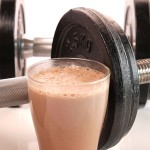What Does The Perfect Post-Workout Protein Shake Look Like?
Author: Dr. Stephen Chaney
 If you work out on a regular basis and read any of the “muscle magazines”, you’ve seen the ads. “Explode Your Muscles.” “Double Your Gains.” They all claim to have the perfect post-workout protein shake, backed by science. They all sound so tempting, but you know that some of them have to be scams.
If you work out on a regular basis and read any of the “muscle magazines”, you’ve seen the ads. “Explode Your Muscles.” “Double Your Gains.” They all claim to have the perfect post-workout protein shake, backed by science. They all sound so tempting, but you know that some of them have to be scams.
I told you about some of the sports supplements to avoid in a previous “Health Tips From the Professor”. In this issue, I’m going to ask “What does the perfect post-workout protein shake look like?”
For years athletes have been using protein beverages containing branched chain amino acids after their workouts to maximize muscle gain and recovery. There was some science behind that practice, but the major questions were unanswered. Nobody really knew:
- How much protein is optimal?
- What kind of protein is optimal?
- What amount of branched chain amino acids is optimal?
- Are some branched chain amino acids more important than others?
- Does the optimal amount of branched chain amino acids depend on the amount of protein?
As a consequence, after workout protein supplements were all over the map in terms of protein source, protein amount, branched amino acid amount and type of branched chain amino acids. Fortunately, recent research has clarified many of these questions.
How Much And What Kind Of Protein Do You Need?
- Recent research has shown that the optimal protein intake for maximizing muscle gain post workout is 15-20 gm for young adults (Katsanos et al, Am J Clin Nutr 82: 1065-1073, 2005; Moore et al, Am J Clin Nutr, 89: 161-168, 2009) and 20-25 gm for older adults (Symons et al, Am J Clin Nutr 86: 451-456, 2007).
- More protein isn’t necessarily better. The effect of protein intake on post workout muscle gain maxes out at around 25 gm for young adults and 30 gm for older adults (Symons et al, J Am Diet Assoc 109: 1582-1586, 2009).
- Whey protein is the best choice for enhancing muscle gain immediately after a workout. Other protein sources (soy, casein, chicken) are better choices for sustaining muscle gain over the next few hours.
Does Leucine Trigger Muscle Growth?
- It turns out that leucine is the only branched chain amino acid that actually stimulates muscle protein synthesis (Am J Physiol Endocrinol Metab 291: E381-E387, 2006). And protein is what gives muscles their strength and their bulk.
- Recent research has shown that 2-3 gm of leucine (2 gm for young adults; 3 gm for older adults) is sufficient to maximize post workout muscle gain if protein levels are adequate (Am J Physiol Endocrinol Metab 291: E381-E387, 2006).
Unanswered Questions About Optimizing Muscle Gain Post-Workout
- Do the other branched chain amino acids play a supporting role, or is leucine alone sufficient to drive post-workout muscle gain?
- Can leucine still help maximize post-workout muscle gain if protein intake is inadequate? If so, how much leucine is needed?
Does Leucine Enhancement Improve Low Protein Shakes?
 A recent study (Churchward-Venne et al, Am J Clin Nutr, 99: 276-286, 2014) seems to answer those two questions. The authors compared the effect of 5 protein-amino acid combinations on muscle protein synthesis in 40 young men (~21 years old) following unilateral knee-extensor resistance exercise. The protein shakes contained:
A recent study (Churchward-Venne et al, Am J Clin Nutr, 99: 276-286, 2014) seems to answer those two questions. The authors compared the effect of 5 protein-amino acid combinations on muscle protein synthesis in 40 young men (~21 years old) following unilateral knee-extensor resistance exercise. The protein shakes contained:
- 25 gm of whey protein, which naturally contains 3 gm of leucine (high protein)
- 6.25 gm of whey protein, which naturally contains 0.76 gm of leucine (low protein)
- 6.25 gm of whey protein with 3 gm of leucine (low protein, low leucine)
- 6.25 gm of whey protein with 5 gm of leucine (low protein, high leucine)
- 6.25 gm of whey protein with 5 gm of leucine + added isoleucine and valine (the other branched chain amino acids). (low protein, branched chain amino acids).
The results were clear cut:
- The high protein shake (25 gm of protein) was far superior to the low protein shake (6.25 gm of protein) at enhancing post workout protein synthesis. This is consistent with numerous other published clinical reports.
- Adding 3 gm of leucine to the low protein shake had no effect on post-workout protein synthesis, but 5 gm of added leucine made the low protein shake just as effective as the high protein shake at supporting post-workout protein synthesis.
In short, leucine can improve the effectiveness of a low protein shake, but you need more leucine than if you chose the high protein shake to begin with.
- Adding extra branched chain amino acids actually suppressed the effectiveness of leucine at enhancing post-workout protein synthesis. These data suggest:
- Leucine probably is the major amino acid responsible for the muscle gain reported in many of the previous studies with branched chain amino acids.
- If the other branched chain amino acids play a supporting role in the muscle gain, the quantities that occur naturally in the protein are probably enough. Adding more may actually reduce the effectiveness of leucine at stimulating muscle gain.
While this is a single study, it is consist with numerous other recent clinical studies. It simply helps clarify whether leucine can increase the effectiveness of a low protein supplement. It also clarifies the role of branched chain amino acids.
Also, while this study focused on protein synthesis, numerous other studies have shown that optimizing post-workout protein and leucine intake results in greater muscle gain (for example, Westcott et al., Fitness Management, May 2008)
The Bottom Line
Research on post-workout nutrition to optimize muscle gain from the workouts has come a long way in recent years. It is now actually possible to make rational choices about the best protein supplements and foods to support your workouts.
- If you are a young adult (17-30), you should aim for 15-20 gm of protein and about 2 gm of leucine after your workout.
- If you are an older adult (50+), you should aim for 20-25 gm of protein and 3 gm of leucine after your workout.
- If you are in between you are on your own. Studies haven’t yet been done in your age group, but it’s reasonable to assume that you should aim for somewhere between the extremes.
- If you are getting the recommended amounts of whey protein, the leucine level will also be optimal. If you are using other protein sources you may want to choose ones with added leucine.
- The research cited above shows that you can make a low protein supplement effective by adding lots of leucine, but that’s going to require artificial flavors and sweeteners to cover up the taste of that much leucine. I would recommend choosing one that provided adequate protein to begin with.
- While the research in this area is still somewhat fluid, I would avoid protein supplements with added branched chain amino acids other than leucine. If the paper I cited above is correct you probably get all of the other branched chain amino acids you need from your protein and adding more may actually interfere with the effect of leucine on muscle gain.
- I’d pretty much forget all the other “magic ingredients” in post-workout supplements. If you’re a novice there is some evidence that arginine and HMB may be of benefit, but if you have been working out for more than 6 months, the evidence is mixed at best. As for the rest, the clinical studies are all over the map. There’s no convincing evidence that they work.
- Whey protein is the best choice for enhancing muscle gain immediately after your workout. Soy and casein are better choices for sustaining muscle gain over the next few hours. If you’re looking at meat protein, chicken is a particularly good choice. Four ounces of chicken will provide the protein and leucine you need to sustain muscle gain for several hours.
- Even if you are not working out, recent research on dietary protein and leucine has important implications for your health. In a recent “Health Tips From the Professor” I shared research showing that optimizing protein and leucine intake helps to increase muscle retention and maximize fat loss when you are losing weight.
These statements have not been evaluated by the Food and Drug Administration. This information is not intended to diagnose, treat, cure or prevent any disease.
